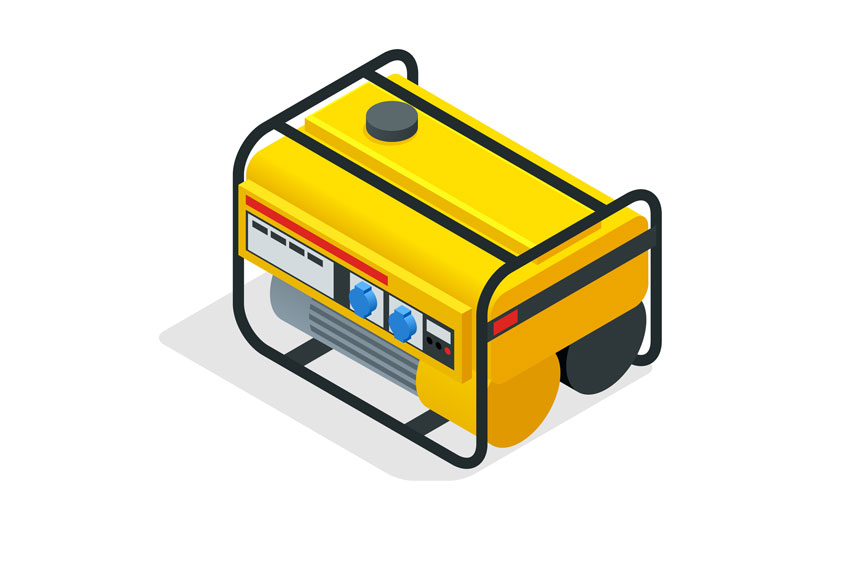Power outages are annoying at best, deadly at worst. Now with the coronavirus restrictions and so many people working and schooling at home, loss of electrical service takes on a new dimension—lost productivity.
Missing a TV show or two is a minor inconvenience, and dining by candlelight can be a welcome, even romantic, change in routine. But when you can’t do your job or finish your studies due to a power outage, things can get serious. Income can be lost. Important meetings and classes can be missed. That’s why having reliable backup power is even more important during the “New Abnormal.”
Fortunately, there’s a wide variety of options for backup electrical power that suit all budgets and circumstances.
Choosing a Backup Power Supply
People who live and work in remote areas know that power outages can take a while to resolve. But what about urbanites? True enough, outages are usually dealt with in a relatively short (or at least shorter) time in the cities and towns, but even a few hours of downtime can be a big problem. And when storms like last year’s bomb cyclone or winter snow and ice hit, even urban areas can be without power for a day or more, creating serious problems, especially for people with health or mobility issues.
Your choice of backup power will depend on your individual needs and your budget.
Backup Batteries
Backup batteries, both integrated and standalone, can be a temporary option for your computer or Wi-Fi network, but when you have a big project to finish, a dark house full of bored kids, appliances that don’t work, or someone relying on electrical devices for home health care, a backup generator is a better solution.
Storage Batteries
If you want a system that gives backup power for relatively short periods of low wattage demand without the hassle of a portable generator or the expense of a permanent installation, a storage battery or batteries might be right for you. Like a car battery charger, these devices are trickle-charged and store energy. They also have built-in AC inverters to run household appliances. You still need to plug individual cords into the units, but they’re virtually maintenance-free and can be used indoors as long as ventilation is provided in case the batteries release fumes. Many are portable and can be used on job sites, as well.
They’re best for short outages with limited needs since they have fairly low storage capacity but may be a versatile solution if you only need minimal power to ride out an outage.
Backup Generators
Generators fall into two basic categories: portable and permanent. Choosing the best one for you is a balance between your needs and your budget. Here are some considerations:
Gasoline-Powered Portable Generators
Portable gas-powered generators are the least expensive and come in a variety of outputs to meet different needs. Properly sized, operated, and maintained, they’re a good choice for occasional outages, are budget-friendly, and can be used (carefully) by homeowners.
They also require the most work to set up, maintain, and operate and can be dangerous to use. If you’re considering a portable generator, read our article Backup Generator Benefits before buying. It has safety tips as well.
Any generator that ties into the household electrical supply should be set up by a licensed electrical contractor. Improper connections can result in severe damage to your home’s circuitry, injury, and devastating house fires.
Permanent Installations
Long the choice for commercial locations, a permanently installed generator has several advantages for homeowners too. Installed similarly to an air conditioning unit, they’re as close to a “set it and forget it system” as you can get. They’re normally connected to a natural gas or propane supply, so you don’t have to worry about storing potentially dangerous gasoline—or running out at the worst time. They have sophisticated controls and switches that automatically turn the unit on when an outage is detected. They also cycle the generator periodically to keep it in good working condition and notify you when it isn’t.
They’re also the most expensive to buy and install but are a very reliable source of power for places where minimizing downtime is important. Talk to a licensed electrician about your options and costs.
Stay Safe with Professional Help
Choosing the right generator and using it safely requires a knowledge of electrical circuitry and codes. Don’t risk injury, shock, fire hazards, or expensive repairs by getting in over your head.
If you’re thinking about adding safe, reliable backup power or have any problems or concerns about your electrical service, the pros at Allstar Electrical Services are ready to help. We offer homeowners, builders, and businesses reliable, professional electrical work that is safe and up to code.
Call Allstar Electrical at (303) 399-7420 or visit our website. We’ve served Colorado’s Front Range for over 20 years, are top-rated by the BBB and Angie’s List, and are a Home Advisor certified contractor.


